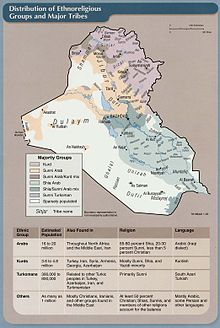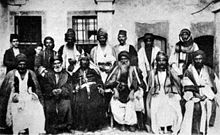Religion in Iraq
Religion in Iraq dates back to Ancient Mesopotamia, particularly Sumer, Akkad, Assyria and Babylonia between circa 3500 BC and 400 AD, after which they largely gave way to Judaism, followed by Syriac Christianity and later to Islam.
The Iraqi civilization was built by peoples and nations, including the Sumerians, Akkadians, Assyrians, Persians, Turks, Arabs, and Babylonians.
Religious and cultural circumstances have helped Arabs to become the majority of Iraq’s population today, followed by Kurds, Turkmen, and other nationalities.
The religious development of Mesopotamia and Mesopotamian culture in general, especially in the south, was not particularly influenced by the movements of the various peoples into and throughout the area.
Circa 2335 BC, Sargon of Akkad conquered all of Mesopotamia, uniting its inhabitants into the world's first empire and spreading its domination into ancient Iran, the Levant, Anatolia, Canaan and the Arabian Peninsula.
The Akkadian Empire endured for two centuries before collapsing due to economic decline, internal strife and attacks from the north east by the Gutian people.
After six years, with religious figures coming to power, the situation changed fast as the tide of religiosity receded.
According to Iraqi thinker Izzat Shahbandar, this came after their ruling political class came to power, and their role in sectarianism and state corruption, and by regularly occupying television slots to spread their agendas.
[9] The population, according to the latest census prepared by the Central Agency for Public Mobilization and Statistics for the year 2017, is 37 million, 139 thousand, and 519 people, with a growth rate of 2.61%, with a male-to-female ratio at birth of 103.9%.
The city is now a great center of pilgrimage from throughout the Shia Islamic world even though his grave is debatable and it is estimated that only Mecca and Medina receive more Muslim pilgrims.
In addition, some female relatives of the Islamic prophet Muhammad are buried in Samarra, making the city one of the most significant sites of worship for Shia and a venerated location for Sunnis.
Smaller sects of Islam exist in the country, such as the small Shia Shaykhist community concentrated in Basra and Karbala.
Most Iraqi Kurdish Muslims follow the Shafi school of Islamic law, while others are members of either the Qadiri or the Naqshbandi Sufi tariqah.
[11] The religious and tribal factors and tensions inherent in Iraq's political culture do not significantly affect the Iraqi Turkmen Sunnis and Shias.
[16] The post-2003 war have displaced much of the Assyrian community from their homeland as a result of ethnic and religious persecution at the hands of Islamic extremists.
[9] They are concentrated in the Sheikhan district, northeast of Mosul, and Sinjar Mountain, near the Syrian border in northwestern Iraq.
[20] Arguably the world's oldest monotheistic religion, Zoroastrianism (Zardashti in Kurdish) has almost disappeared in the last century until recent years.
According to Yasna, an association that promotes Zoroastrianism in Kurdistan, since 2014 about 15,000 people have registered with the organization, most of them Kurds converting from Islam.
[25][26] The surge in Kurdish Muslims converting to Zoroastrianism, the faith of their ancestors is largely attributed to disillusionment with Islam after the years of violence and barbarism perpetrated by the ISIS terrorist group.
However, Mandaeans believe their religion predates Judaism and Christianity as a monotheistic faith tracing it back to their first prophet Adam.
Besides these southern regions and Ahvaz in Iran, large numbers of Mandaeans can be found in Baghdad, giving them easy access to the Tigris River.
The Jewish presence in Iraq dates back to the days of the Babylonian and Assyrian captivities, during which they experienced significant displacement.
Jewish communities were also present in Basra and northern Iraq, where they played an important role in shaping the country's development.
Notable Jewish figures in Iraq include Sassoon Eskell, Menahem Saleh Daniel, Salima Pasha, Mir Basri, Anwar Shaul, Naim Dangoor, and Ibrahim Hesqel.
Following the establishment of Israel in 1948, Jews in Iraq faced persecution, as was the case in much of the Arab and Muslim world.
[51] In March 2023, India formally requested Iraq renovate a historic Sikh temple, Baba Nanak Shrine, which was built in the memory of the faith's founder Guru Nanak who once visited Baghdad as part of his travels in the Muslim world during a visit by Iraqi National Security Adviser, Qasem Al-Araji, to Delhi where he met his Indian counterpart Ajit Doval.









